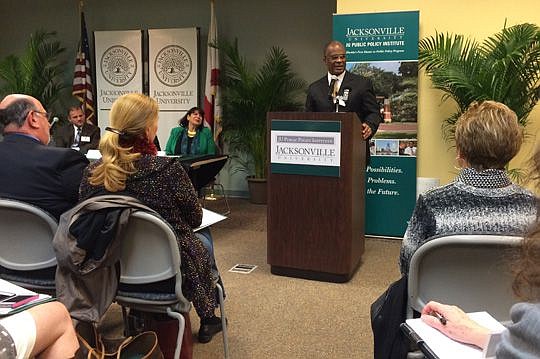
Circuit Court Judge Henry Davis says when he presided over a juvenile court in Jacksonville one day last week, 15 of the 18 cases on the docket involved African-Americans accused of crimes.
On some days, he said, every defendant in his courtroom is African-American.
His point: Serious discussions about juvenile justice must confront racial issues that he says are a continuing outcome of slavery.
“We’re here talking about juvenile justice, we’re talking about black kids. That’s what we’re here talking about,” Davis said Thursday at a Jacksonville University Public Policy Institute forum on juvenile justice. “(Today) was a typical day in juvenile delinquency court or adult court. It doesn’t matter if it’s Duval County or Nassau or Clay or any place else in the country.”
Davis says community leaders must overcome their reluctance to have conversations about race.
“I bring up race with my colleagues, they turn red and leave,” said Davis, who was joined on the panel by State Attorney Angela Corey, Public Defender Matt Shirk and Jacksonville Sheriff John Rutherford.
“We have a history in America, something we don’t want to talk about, of slavery. The lingering effects of slavery are here today,” Davis said. “There are a lot of wonderful programs, but we have to address the fact that we have a distinct culture of people who are still the products of slavery.”
Davis said many children are born without a chance of a life without crime.
“They didn’t ask for their circumstances,” Davis said. “If I had the parents that some of these kids had I would have been dead, too, by now.”
About 200 people attended the forum, during which Rutherford and Corey cited statistics showing that juvenile and adult crimes are decreasing in Jacksonville.
“I don’t want to minimize the work that we have ahead of us,” Rutherford told the audience, which was heavily attended by law enforcement officials, social service workers and juvenile advocates. “But folks, when I see so many good shepherds in one room that are trying to make a difference, I want you to know what you are doing is having an impact, and God bless you for all the hard work that you are pouring into the youth of this community.”
The forum turned testy when Corey and Shirk continued their ongoing public wrangling over whether juvenile offenders should enter the adult system in non-capital cases and when civil citations should be issued to juveniles.
Shirk maintains juveniles should only be charged as adults in capital cases, and that a judicial oversight process should be implemented over the State Attorney’s Office’s “direct filing” of juvenile cases to adult court.
“There’s no opportunity for a child to go to a judge and say, ‘I’m not an appropriate case (for adult court)’ and have a court send the case back to juvenile,” he said.
Shirk also says that too often, first-offender juveniles are charged with crimes rather than being issued civil citations, a state initiative designed to give children less harsh punishments for non-violent crimes.
Unlike in other circuits, Corey’s office prosecutes juveniles charged with simple battery –– attacking someone without causing serious injuries.
“Frankly, we’re in the business of wanting to have civil cases. It’s good for our community and it’s good for the children,” Shirk said. “It’s also good for your pocketbook because it’s less tax dollars that we have to spend representing folks.”
Noting that the State Attorney’s Office has seven juvenile diversion programs, Corey said issuing civil citations rather than misdemeanor battery charges often isn’t in the community’s best interest.
“The cold hard truth is some juveniles can’t be diverted and some can’t stay in the juvenile system,” she said. “We don’t make them adults by putting them into the adult system. What we do when we follow the law in the state of Florida is give ourselves more options in adult court.”
Corey also criticized Shirk for quoting statistics indicating the 4th Judicial Circuit has more direct filings from juvenile to adult court than any other Florida circuit.
“I’ve had to correct that misinformation for the last three years,” she said. “We divert cases that you never hear about because we do it working with police before you even know about it and before Judge Henry Davis knows about it. And we’re going to keep doing it.”
Following the forum, Jacksonville University Public Policy graduate student Kevin Barth said he agrees with Corey’s stances on direct-filing and issuing civil citations.
“You’ve got to look at the history and you’ve got to look at the facts, like the state attorney said, and then you can come up with a conclusion,” he said.
The three-year-old JU Public Policy Institute is becoming a hotspot for community discussions. Previous forums this semester covered education, energy, children’s health, and domestic and foreign policy.
“This university ought to be a place where we can talk about tough things,” JU President Tim Cost said in his opening remarks at the forum. “We ought to be able to talk in an intellectually honest way; we ought to be a place where we can gather and serve their intellectual curiosity on all matters.”